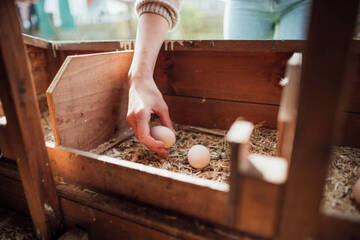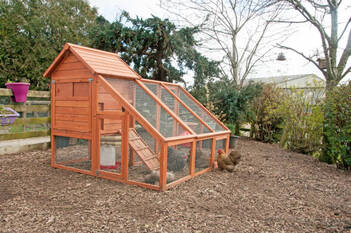Help Get Ready For Your Hens With Our Expert Advice
Welcoming rescue hens in to your life is an exciting experience and can be the beginning of a wonderful friendship. Once you've decided to rehome some hens it is time to prepare and get your coop ready. You’ll need to make sure you leave enough time to make adequate preparations, as well as to go shopping for everything they need.
Housing
|
The most important thing your hens need is a safe place away from predators. Foxes, badgers, mink and stoats are amongst the most common animals to prey upon your hens. Coops should be strong and sturdy enough to repel any attempts to get inside. If you have a built-in run be aware that predators will try to dig underneath. Stone slabs or a wire mesh on the ground around the run should prevent any attempt at tunnelling.
Wood shavings are ideal bedding for the coop with a little straw in the laying boxes. Avoid using sawdust or hay, as the dust can lead to respiratory problems. Red mite can be a common problem. This tiny blood-sucking creature finds refuge inside the coop, between boards and in corners. It is something that can be controlled with many products on the market & like fleas will flare up in the warmer weather & die down during the winter months. The hen house is best kept on top of daily by removal of droppings & soiled straw then top up with clean straw. Give the house a thorough clean monthly ensuring the corners including the roof corners & perches are treated with mite powder. |
Feeding
At first your hens might not be too adventurous when it comes to a varied diet. At the farm they have been fed only on layers mash and this is all they will recognise as food. It doesn't take long for their natural instincts to kick in and they'll soon be foraging and picking up scraps of leafy greens. Its a good idea to start with layers mash as the main source of their feed and slowly introduce mixed corn, pellets and treats. Water should be available at all times in a bowl or drinker.
Everything Else
There a few unique aspects to rehoming hens from the farming industry as apposed to buying hens from a breeder. Its important to remember that the hens have had a very tough existence and will certainly look a little worse for wear. Missing feathers, pale faces, clipped beaks and overgrown combs are the tell-tale traits of a rescue hen. With love and care they will look much better in a few weeks. Some hens may have bruised legs and will limp at first, this is usually the result of rough handling at the farm but will heal after a while.
If you are hoping for some eggs for your breakfast you can usually expect a few at first then none for a while whilst the hens adjust to their new surroundings.
Homes4Hens Rescue CIC will never knowingly rehome a hen that is either sick or injured.
If you are hoping for some eggs for your breakfast you can usually expect a few at first then none for a while whilst the hens adjust to their new surroundings.
Homes4Hens Rescue CIC will never knowingly rehome a hen that is either sick or injured.


